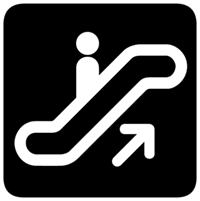
Nicholson Baker, 1988
Premise Okay, yes, there's somewhat more to it than that. Every fleeting thought that the yuppie has while on the escalator is explored in exhaustive detail, complete with multi-page footnotes, allowing a single escalator ride to fill 135 pages of small type.
Evaluation
Commentary Now, "which urinal?" and "itch on face" might not make for much of a book. But Baker gets a lot of mileage out of observations that are only half a degree removed from this level, thoroughly unpacking the experiences that constitute our lives but which we rarely articulate. A perfect example: you know how when you pass someone's desk on the way out of the office, and you're making small talk, and then the person you're talking to needs to take a call, and you can't just walk away because you were in the middle of a conversation and that'd be rude, but it's also sort of awkward just standing there waiting to resume the conversation because it wasn't very important? Baker continues:
Baker spends a lot of time on optimization; much of the book is devoted to breakthroughs in hand-washing, sock-donning, shoe-tying and the like. And again, there's the shock of recognition that, yes, we really do put a lot of ephemeral thought into optimizing our routines, all those little breakthroughs: shave at night because the extra eight hours of beard growth is a small price to pay for an extra three minutes in the morning! pulse the turn signal rather than click it all the way down! which takes more time — balling up socks to keep them together, or hunting down each sock's mate when they're loose in the drawer? Baker also touches on all those idle thought experiments: hmm, would it be worth losing my left hand for ten million dollars? how about my right? how about fifty million? One could also make a case that The Mezzanine is one of the sunniest books ever to go to press. This guy loves everything! The design of milk cartons sends him into a six-page paean that wraps up,
Someone once said that Catch-22 was the best book ever written from which any fifty pages could be removed without affecting its quality. Much the same is true for The Mezzanine: it could be one-third as long and still have the same impact, and it does drag after a while. But it's worth reading through to, or at least skipping to, the end, where the point of the exercise appears. The narrator is reading the Meditations of Marcus Aurelius and is struck by the assertion that "Manifestly, no condition of life could be so well adapted for the practice of philosophy as this in which chance finds you today!" That is to say: the pension funds, the laundry detergent, the muffler — those things are life. Those things are the universe. And they're only as trivial as you make them.
Return to the Calendar page! |

